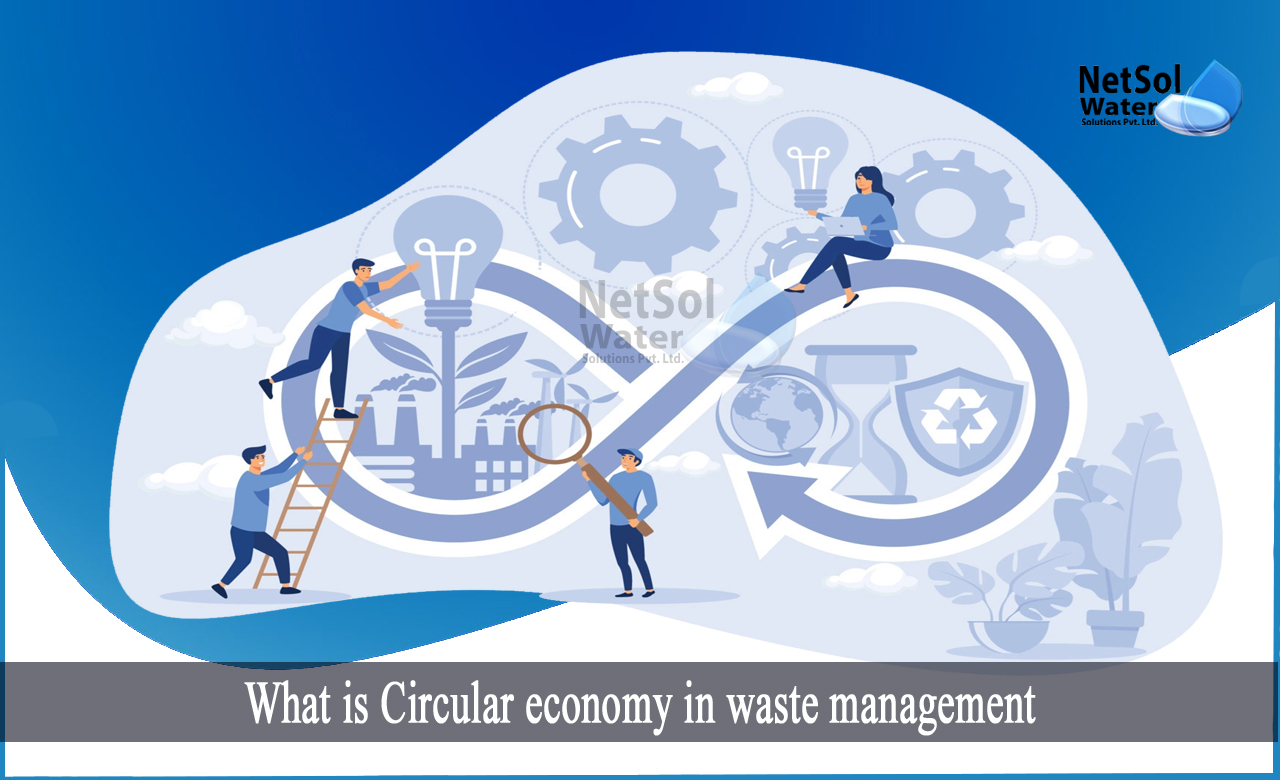Introduction
The circular economy is a notion that has evolved over decades in a brave new world of sustainability, to become a viable alternative to our old, wasteful systems of uncontrolled consumption. It is progressively finding its way into the mainstream and demands nothing, in the way of consumer or business sacrifice.
This approach can pave the way for long-term design, maintenance, repair, reuse, remanufacturing, refurbishment, and recycling. In this piece of article, we will discuss about circular economy, and its importance in solid waste management.
What is Circular economy in waste management?
A circular Economy (CE) is a long-term alternative to the classic linear (take-make-dispose) economic model, which reduces waste by reusing, repairing, refurbishing, and recycling, existing materials and goods.
To manage the depletion of natural resources and deal with our ever-increasing volume of waste, we must abandon traditional linear conceptions of taking,making, and disposing of, in favour of closed loops that value all resources consumed.
Simply said, our "disposable culture" must be altered. We can only hope to overcome the difficulties presented by our current economies, by keeping products, packaging, and, eventually resources, in circulation for as long as feasible.
Why is circular economy important in solid waste management?
As previously stated, the fundamentals of a circular economy are, the reduction of our dependency on non-renewable resources, and the elimination of waste. However, its goals have expanded far beyond this, and its scope now includes a number of other principles, which have come to be considered essential components of a truly circular economy.
Principles of circular economy
1. No waste
Zero waste is the major goal of a circular economy.
2. Biological and technological cycles
Materials and components utilized in a truly circular economy should be, biodegradable or recyclable/reusable.
3. Plan for the Future
Products should be built to last, with recycling, repair, and upgradability as major features.
4. Renewable Energy
Renewable energy sources must be utilized to ensure that manufacturing cycles are sustainable.
5. Users vs. Consumers
Users should be redesigned as consumers. Products and materials can be considered "leased" rather than "sold" to the user.
6. Natural system regeneration
A truly circular economy should prioritize the regeneration of exhausted natural systems.
7. Keep what you've already made
Ensure that the life of existing items is maximized and prolonged.
Working mechanism of circular economy
Firstly, raw materials are ethically and sustainably sourced from the earth, plants, and animals in the biological cycle. After that, any "waste" is digested and returned to the land as compost.
Secondly, raw materials are processed or created in the technical cycle, to ensure the lifespan and simplicity of recycling. After that, the products are used before the materials are recycled, or individual components are reclaimed and reused.
Thirdly, the energy utilized in manufacturing in both cases comes from renewable sources, such as solar electricity. Products may fall within both the biological and technological cycles in various circumstances.
For example, Plastic bottles constructed of biodegradable plastic components, should be designed to be refilled numerous times, before reaching the disintegration stage.
Conclusion
While much of the theoretical core of the circular economy has been agreed upon, there are several schools of thought on how these principles are developing, and how will they evolve.
However, an underlying fact shared by all approaches is the notion that the circular economy, rather than being a burden, should be viewed as an economic and social opportunity.
How do we assist?
Netsol Water is committed to addressing the most pressing issues of solid waste, wastewater, etc., through creative science and technology. This includes guaranteeing a resilient and valuable ecosystem, transitioning to clean energy and resources, and fostering the establishment of future companies cantered on these goals.
We also provide many innovative techniques and products for solid waste management, including Solid waste converters, organic waste converters, food recyclers, etc. These equipment’s use sophisticated technologies, and provide ways to achieve sustainability.
Netsol Water is Greater Noida-based leading water & wastewater treatment plant manufacturer. We are industry's most demanding company based on client review and work quality. We are known as best commercial RO plant manufacturers, industrial RO plant manufacturer, sewage treatment plant manufacturer, Water Softener Plant Manufacturers and effluent treatment plant manufacturers. Apart from this 24x7 customer support is our USP. Call on +91-9650608473, or write us at enquiry@netsolwater.com for any support, inquiry or product-purchase related query.



